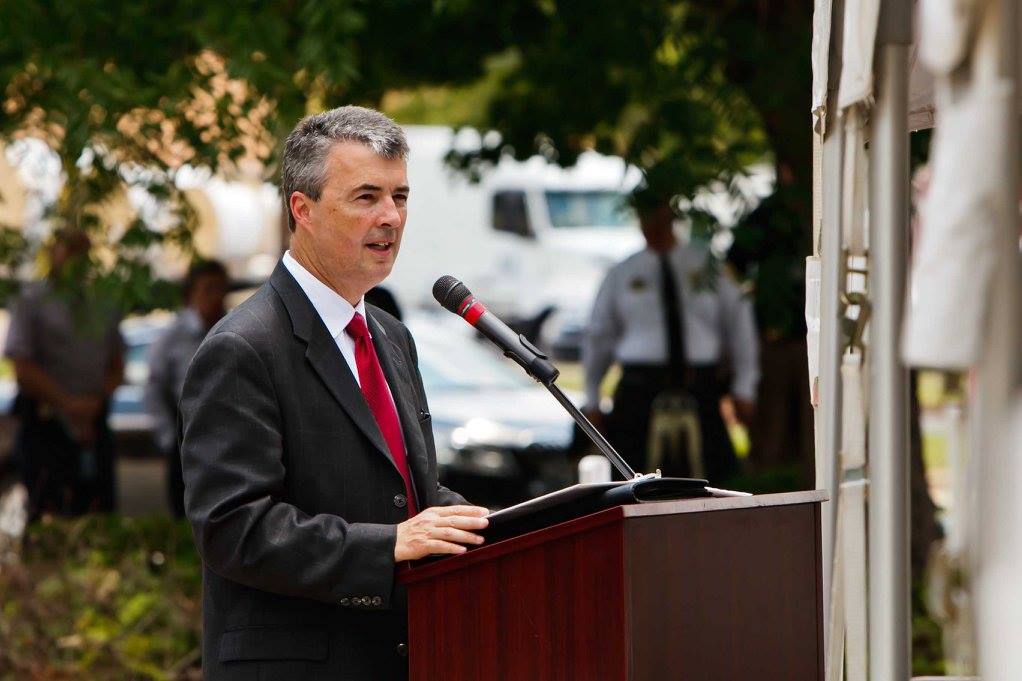Morgan County Sheriff Ana Franklin sued for using office to target local blogger and former jail warden

In an explosive lawsuit, Morgan County Sheriff Ana Franklin is facing accusations that she and her deputies systematically used the sheriffs office to target personal and political opponents. This is just the latest in a series of lawsuits and charges involving Franklin and her office over the last 2-3 years. The lawsuit was filed by Leon Bradley, who served as the Morgan County jail warden from 2003 until he was fired in October 2016. Bradley’s sour relationship with the sheriff’s office and numerous deputies from it reads like a movie script. After he was fired Bradley faced several criminal charges of document tampering which according to an April 2018 WHNT news report, were dismissed after several days of motions. With a scathing report by Morgan County Circuit Judge Glenn Thompson said, “the sheriff and an investigator misled the court to get a search warrant and that they encouraged the illegal entry to blogger Lockhart’s Morgan County business, by a confidential informant.” During the hearing that lead to the charges against Bradley being dropped, WHNT reported: Testimony Friday contained a number of major surprises: The confidential informant used in the case is the grandson of the Morgan County blogger Glenda Lockhart, who Sheriff Ana Franklin has long feuded with. The young man was paid $500 to enter the business and gather materials that were the basis for the search warrant; Two Morgan County investigators said they drove around the FBI office parking lot Huntsville, looking for cars they recognized in order to find out what Morgan County Sheriff’s Office employees had been talking to the FBI. One of the investigators said they heard 30 to 40 sheriff’s office employees had spoken to the FBI; An Etowah County Sheriff’s investigator testified they came in to assist on the Bradley case, but based on what they’ve learned, they felt Morgan County investigators lied to them, used them and they wouldn’t have taken the case given what they know now Glenda Lockhart is a blogger for the Morgan County Whistle Blowers website who said this in a Saturday post that included the new lawsuit in its entirety, “In their official and individual capacity; and THE MORGAN COUNTY SHERIFF’S OFFICE. WOW! It feels as if Warden Bradley’s Attorneys summed up in 56 pages exactly the who, what, when, where, and why of what Ana Franklin, Bones Wilson, Blake Robinson, Justin Powell, and others did to us to cover their sorry butts.” Al.com covered the filing by Bradley in a lengthy expose, reporting: Bradley’s allegations against the sheriff and deputies include: Violating his First Amendment Rights to free speech Violating his Fourth Amendment right against unreasonable search, seizure and false arrest Violating his Fifth and Fourteenth Amendments rights Conspiracy to deprive his constitutional rights Conspiracy to engage in a pattern of racketeering activity Violation of the Electronic Communications Privacy Act Invasion of privacy Malicious prosecution Conspiracy to violate civil rights The Sheriff’s office told AL.Com they had yet to review the lawsuit. Ana Franklin, who is Alabama’s only female sheriff announced earlier this year she would not be running for reelection. AL.Com reported at the time, “Franklin’s seven years in office haven’t come without controversy. Most notably, Franklin was found in contempt of court last year because she loaned $150,000 of the jail’s inmate feeding funds to a crooked used car lot. She’s the subject of a federal investigation, as reported recently in the New York Times. The sheriff and her office have been blasted by the local Morgan County Whistleblower blog.”
Border measures part of President Donald Trump’s bigger immigration crackdown

The separation of families at the U.S.-Mexico border caught the attention of the world and prompted mass outrage, but it only tells a small part of the story surrounding President Donald Trump‘s administration’s immigration policy. In reality, the government is working to harden the system on multiple fronts to curb immigration, carving a path around various court rulings to do so. The administration is seeking to lock up families indefinitely, expand detention space and tighten asylum rules and apply more scrutiny to green card applications. Many of the initiatives received little attention during the chaos over separated families, but they show how determined President Donald Trump is to stop immigrants from coming — both legally and illegally — even in cases where the administration has been stymied by the courts. Other administrations may have faced similar problems with illegal immigration and tried similar solutions, but all have been unable to stem the flow of migrants streaming through southern border. No other president, however, has campaigned so vociferously on the topic. “The United States will not be a migrant camp and it will not be a refugee holding facility,” President Donald Trump declared days before putting an end to the separation of parents from their children. “Not on my watch.” This week’s headlines were dominated by stories of reunions of immigrant parents and their young children that the Trump administration had to carry out under a court order. The White House said it “worked tirelessly” to complete the reunifications and make sure the children were put back into safe homes. In the same week, however, the administration made other moves to clamp down on immigrant families, asylum seekers and those seeking green cards. The administration’s attempts to deter Central American families and children from making the trip north are designed to send the message to immigrants — and Trump’s supporters in an election year — that reaching the United States is going to get harder, and so will getting papers to stay in the country legally. “All of these things, I think, are part of a bigger ultimate aim, which is to significantly reduce immigration of all kinds to the United States over the longer term, and in the process, the real desire is to change the character of the country,” said Doris Meissner, a former commissioner of the Immigration and Naturalization Service in the Clinton administration. Before departing the White House this week for his European trip, Trump offered his own solution for the government missing a court-mandated deadline to reunite some families: “Don’t come to our country illegally.” In Europe, the president hasn’t shied away from offering his views on the flow of immigration across the pond. Trump pressed ahead with his complaints that European immigration policies are changing the “fabric of Europe” and destroying European culture. He reiterated a position he articulated in a British tabloid where he said: “I think allowing millions and millions of people to come into Europe is very, very sad.” The Trump administration announced plans in April to prosecute illegal border crossers with the crime of improper entry, and in doing so, jailed some parents caught on the border and placed their children in government custody. The U.S. government was sued and the public was outraged, prompting Trump to halt the separations. The chaos over the separations has put the administration in the difficult position of having to release families with ankle-monitoring bracelets into the public — a practice Trump has decried — while at the same time attempting a series of legal maneuvers to argue for tougher enforcement capabilities. That’s because two court cases in California restrict what the government can do in carrying out hardline immigration policies. One requires the government to release immigrant children generally after 20 days in detention. The other has banned the separation of families and placed the government under tight deadlines to reunite parents and children. In an attempt to comply with both rulings, the White House wants to present families with a choice: Stay together in detention or release the child to a government program for immigrant youth for potential placement with a relative while the parent remains locked up. It’s unclear whether the administration has enough detention beds to do so, but it’s looking. Homeland Security has formally requested 12,000 beds for family detention, with 2,000 beds to be made available immediately at U.S. military bases. The Defense Department has said it also received a request to house up to 20,000 unaccompanied immigrant children. Officials are also seeking to send immigrants back to their countries sooner and make it harder for them to seek asylum in a backlogged courts system where it can take years to get a ruling. Trump officials say too many people are claiming they are persecuted when they are not, adding that only 20 percent of asylum claims are granted. Asylum officers tasked with screening immigrants stopped at the border were told this week to heed a recent opinion by Attorney General Jeff Sessions that gang and domestic violence should not generally be a reason for asylum — reasons cited by many immigrants fleeing bloodshed in Central America. The result: fewer immigrants will pass these initial screenings that enable them to seek asylum before an immigration judge, said Megan Brewer, an immigration attorney in Los Angeles and former asylum officer. “If they don’t comply, all their decisions are going to be sent back to them,” she said. “The average officer will go with the path of least resistance.” Immigrants in the country legally also face new hurdles under various policies. Since taking office, the administration has ended protected status for hundreds of thousands of people from countries recovering from war and natural disasters, slashed the number of refugees allowed into the United States and said it will seek to strip the U.S. citizenship of those suspected of cheating to get it. And applicants for green cards and other immigration benefits are facing longer waits and more detailed questions. Immigration
Final push in Attorney General runoff brings Trump favorites Pam Bondi and Roger Stone to AL

Alabama Attorney General Steve Marshall and former Attorney General Troy King are making their final pitches to voters ahead of Tuesday’s Republican runoff. Marshall returned to the campaign trail Saturday for the first time following the suicide of his wife last month. Marshall thanked people for supporting him during his loss. He said he never considered dropping out of the race because his wife had urged him to run. “One of the last things that my wife had left for me was a note. She said that I know you are the man for the job and the man for Alabama,” Marshall said. A group of GOP attorneys generals, including Pam Bondi of Florida, held rallies with Marshall on Saturday in both ends of the state. Bondi said “ethics and integrity mean everything” and others praised his record as a prosecutor. “We believe in what he’s doing for Alabama and I believe in what he’s doing for President Trump,” Bondi said Marshall is seeking to win the office in his own right after being appointed last year by then-Gov. Robert Bentley. He previously served 16 years as the district attorney of Marshall County. Both King and Marshall are stressing their records in the heated runoff. King, who was attorney general from 2004 to 2011, is seeking a political comeback. King was appointed as attorney general by then-Gov. Bob Riley. He was elected to a full term in 2006, but he lost the 2010 GOP primary to Luther Strange. In an interview with the Associated Press, King said he was the true Republican in the race, noting that, as a 10-year-old, he went door-to-door campaigning for Ronald Reagan. Marshall, who was initially appointed by Gov. Don Siegelman, switched to the GOP in 2011. “On Tuesday this election is about the Republican Party nominating a standard-bearer. Only one of us is a Republican,” King said when asked why runoff voters should choose him. King will hold a series of Monday rallies with Trump ally Roger Stone. Both campaigns paused their activities last month following the death of Bridgette Marshall. King said he pulled his commercials from the air for a week after the death out of respect for his opponent. In returning to the campaign trail, King said he would focus on contrasting their records. That does not mean the primary has not gotten heated at times. King criticized Bentley’s appointment of Marshall when Bentley was the subject of an ethics investigation as a “crooked deal.” King said Marshall got his dream job and “let a man who corrupted Alabama go free.” Marshall responded that he was ethically required to recuse himself from the investigation, but he appointed an “experienced tough prosecutor” to lead the probe and “six weeks after that Robert Bentley was out of office.” Bentley resigned after pleading guilty to misdemeanor campaign finance violations. Marshall’s campaign sent out a direct mail piece with unflattering headlines from King’s time as attorney general, including that King had briefly been the subject of a federal grand jury investigation. The probe ended without charges. King responded that the probe was politically motivated and was leaked to the press to derail his 2010 campaign. He said it ended without charges because he did nothing wrong. The runoff winner will race Democrat Joseph Siegelman in November. Republished with permission of the Associated Press.
Martha Roby: Pro-life movement momentum is strong

As a member of the House Appropriations Committee, I have the privilege each year to advocate for the priorities most important to the people who live and work in Alabama’s Second District. Among many other key issues, I have been proud to stand up and fight for a strong military and smart agriculture policy on this committee. On the reverse, I am also in a strong position fight against funding from being steered towards programs or organizations that I adamantly oppose. Recently when the Appropriations Committee approved our Labor, Health and Human Services, Education, and Related Agencies (Labor-HHS) Fiscal Year 2019 funding bill, I had the opportunity to speak up for those who cannot speak for themselves: the unborn. As a member of the Labor-HHS Subcommittee, I am extremely proud to report that our bill passed by the full Committee includes the strong pro-life language I have fought for year after year and implements additional policy riders to defend life. Every single one of these measures is critically important and further ensures that no taxpayer dollars can be used for abortions. Among the key pro-life provisions included in the Labor-HHS FY19 funding bill are the Hyde Amendment, which directs that no taxpayer dollars be used to fund abortions, and the Dickey-Wicker Amendment, which bans Labor-HHS funding from being used on research that harms human embryos. In addition to these longstanding pro-life measures, our bill also includes several other important pro-life provisions that continue our efforts to assign greater protections for life under the law. These measures include the Conscience Science Protection Act, which protects the rights of health care providers that do not participate in abortion. In addition, the bill includes language that prohibits funding for fetal tissue research obtained from abortion. This measure might sound familiar because it is a direct response to the 2015 scandal that revealed how Planned Parenthood officials were systematically altering abortion procedures to preserve babies’ organs in order to sell them to researchers for profit. Planned Parenthood’s action was sick, callous, and completely inhuman. Finally, the bill includes language to prohibit abortion providers like Planned Parenthood from receiving any available funding, including through Title X family grants. This measure works hand-in-hand with the Trump Administration’s “Protect Life” rule, which also directs that Planned Parenthood is not eligible to receive Title X grant money. As I have said many, many times: Abortion is not family planning. Abortion is not health care. Organizations that offer these services should not receive taxpayer dollars that are intended for family planning. Throughout my time in Congress, I have remained unapologetically pro-life. I believe life begins at conception, and our laws and policies should reflect a strong commitment to defending life at every stage. I have considered it a great privilege to have a platform with which I can serve as a voice for the voiceless. After eight long years of coming up short pro-life victories, I am encouraged that we now have a President who supports our efforts and is willing to sign important measures into law. The pro-life movement’s momentum is strong, and I look forward to seeing it grow as we continue to impact meaningful change on behalf of the unborn. I am eager to support our Labor-HHS funding bill when it comes before the full House for a vote. ••• Martha Roby represents Alabama’s Second Congressional District. She lives in Montgomery, Alabama with her husband Riley and their two children.
Accusations and name calling heat up Lt. Gov race between Twinkle Cavanaugh and Will Ainsworth runoff

He calls her a “Swampy Star.” She calls him a tiger thief. Alabama Public Service Commission President Twinkle Andress Cavanaugh and state Rep. Will Ainsworth of Guntersville are swapping accusations — and accusing the other of distorting the truth — ahead of Tuesday’s heated GOP runoff in the race for lieutenant governor. Cavanaugh, 52, has an ad targeting Ainsworth’s theft arrest when he was a college student and was accused of stealing fiberglass tigers in downtown Auburn. Ainsworth, 37, is running ads, playing on Cavanaugh’s unusual first name, and lampooning her lengthy resume in politics. The Cavanaugh ad targets Ainsworth’s 2002 arrest on theft charges when he was 20. The charges were later dropped. “It is the most disingenuous and lying ad. … It was a college prank,” Ainsworth said, saying the ad, which displays a photograph of the balding Ainsworth, makes it look like the arrest was recent. Court records show that Ainsworth, along with several others, was charged in 2002 with stealing five fiberglass tigers worth $3,000 each, in downtown Auburn. Cavanaugh defended the ad, saying it was a “serious matter.” “Twinkle Twinkle Swampy Star” is the slogan on an Ainsworth mailer criticizing Cavanaugh’s lengthy resume in politics. He is running a similar television ad with a star-gazing couple. Cavanaugh has spent much of her life in and around politics. She worked as the first female chairwoman of the Alabama Republican Party and worked for the Republican National Committee in Washington and on Gov. Bob Riley’s staff. She was elected to the PSC in 2010 and commission president in 2012. Cavanaugh said she is proud of her record on conservative causes but notes that she also worked for a year as a teacher and started a restaurant business. The heated and expensive race comes for a position that has relatively little power with one big exception: the potential to succeed the governor. The lieutenant governor presides over the state Senate, votes in case of a tie and makes a number of board appointments. The position is most notable because the officer holder takes over as governor if the governor dies, steps down or is in impeached. The lieutenant governor position has been vacant since April 2017, when Kay Ivey succeeded Robert Bentley as governor. Bentley stepped down in the midst of an impeachment push. Cavanaugh had considered running for governor but switched to the lieutenant governor when Ivey announced she was running this year. “I believe our state needs a strong second-string quarterback,” Cavanaugh said of the position of lieutenant governor. She is touting her record on the utility board that she said includes cutting expenses and approving rate reductions. “We need a proven conservative, someone who has a proven record of turning Christian values into strong conservative government,” Cavanaugh said. Ainsworth is a rancher and the owner of a sportsman’s lodge and founder of a prominent hunting and fishing expo. A relative political newcomer, Ainsworth was elected to the Alabama House of Representatives in 2014. In his legislative tenure, Ainsworth is perhaps best known for sponsoring legislation in the wake of the Florida school shooting that would allow certain teachers to carry or access firearms in the classroom. Campaigning as a political outsider, Ainsworth is emphasizing the fact that he has not spent much time in politics. “I’m not a career politician. I’ve actually been involved in the private sector,” Ainsworth said. Ainsworth said as lieutenant governor — the only statewide elected official involved in the daily dealings at the Statehouse — that he wants to help “drive the conversation” at the Alabama Legislature. “The lieutenant governor has the bully pulpit,” Ainsworth said. The Republican nominee will face Democrat Will Boyd in November. Republished with permission from the Associated Press.
Overview of runoffs for US House, state positions on ballot

Only a handful of statewide races are on the ballot in Alabama’s runoff election on Tuesday, July 17, 2018, and all that action is on the Republican side. Most attention nationally will go to the U.S. House race in southeastern Alabama between Rep. Martha Roby and former congressman Bobby Bright. President Donald Trump has endorsed Roby even though she withdrew her endorsement of him in 2016 after the release of the infamous “Access Hollywood” tape. Her criticism fueled a backlash against Roby among Trump-loving Alabamians. Two years later, Trump’s backing could persuade holdouts to support her. But Bright is fully supporting Trump, even though he used to be a Democrat. While election officials don’t expect a large voter turnout, there are six statewide GOP races on the ballot plus one state school board seat. Here is a look at those races: ___ LIEUTENANT GOVERNOR The head of Alabama’s utility-regulating agency is up against a state legislator in the Republican runoff for lieutenant governor. Alabama Public Service Commission president Twinkle Andress Cavanaugh will face state legislator Rep. Will Ainsworth of Guntersville on Tuesday. Cavanaugh carried 43 percent of the vote to 37 percent for Ainsworth in the three-way GOP primary. Cavanaugh also led all candidates for lieutenant governor in fundraising with nearly $1.1 million in total contributions through April. The lieutenant governor’s main duty is presiding over the state Senate, but the office has been vacant since April 2017. That’s when now-Gov. Kay Ivey succeeded Robert Bentley following his resignation and guilty plea to a campaign finance charge amid a sex-tinged scandal. The eventual Republican nominee will face Democratic minister Will Boyd in November. ___ ATTORNEY GENERAL Alabama Attorney General Steve Marshall is trying to fend off a challenge from a former attorney general, Troy King, in the GOP primary on Tuesday. Marshall has served in the job since February 2017, when then-Gov. Robert Bentley appointed after naming Luther Strange to the U.S. Senate. Marshall previously worked as a county prosecutor. The 53-year-old Marshall had a razor-thin lead over the 49-year-old King in the primary in June, but it wasn’t enough to avoid the runoff. King was appointed attorney general in 2004 and won a full term before losing a bid for re-election. Both Marshall and King temporarily paused their campaigns following the suicide of Marshall’s wife last month. The winner will face Birmingham attorney Joseph Siegelman, who’s the son of former Gov. Don Siegelman. ___ APPEALS COURTS Three statewide appeals court seats are at stake in Alabama’s Republican runoff. Gubernatorial appointee Brad Mendheim and Sarah Hicks Stewart of Mobile are in a runoff for a seat on the nine-member Alabama Supreme Court. Mendheim is a former circuit judge from southeast Alabama who led primary balloting. Alabama Tax Court Judge Christy Edwards of Montgomery and Baldwin County Circuit Judge Michelle Manley Thomason are competing for the Republican nomination for a judgeship on the five-member Alabama Court of Civil Appeals. And west Alabama District Attorney Chris McCool and Assistant Alabama Attorney General Rich Anderson are vying for a position on the five-member Alabama Court of Criminal Appeals. No Democrat is running for any of the three judgeships in November, so winning the GOP runoff is tantamount to election. ___ AGRICULTURE AND INDUSTRIES A runoff will decide the race for the Republican nomination for commissioner of the Alabama Department of Agriculture and Industries. Longtime state Sen. Gerald Dial of Lineville will face Rick Pate, a farmer and businessman who’s mayor of Lowndesboro. The 63-year-old Pate outdistanced the 80-year-old Dial in the four-person primary in June, but he didn’t get enough votes to win the nomination outright. Both candidates are portraying themselves as farmers. Pate is a cattle breeder west of Montgomery, and Dial says he farms timber. No Democrats are running, so the eventual Republican nominee is virtually assured of winning in November. ___ STATE SCHOOL BOARD Two candidates from southeast Alabama are vying for the Republican nomination in the only state school board race on the runoff ballot. Dothan school board member Melanie Hill and Auburn City School Board President Tracie West are seeking the nomination for the District 2 position on the Alabama State Board of Education. Hill led West narrowly in the four-person primary contest. Both support repealing Common Core educational standards, and both are touting their experience as in education and leadership roles. The winner will face Democrat Adam Jortner in November. He teaches history at Auburn University. Republished with permission of the Associated Press.
Vice President Mike Pence endorses Martha Roby ahead of primary runoff election

Vice President Mike Pence threw his support on Friday behind Alabama 2nd District U.S. Rep. Martha Roby’s reelection campaign. “President Trump and I support Martha Roby – a strong supporter of tax cuts & President Trump’s pro-growth, America First agenda! Get out Tuesday and support Team Roby,” the Veep tweeted. Roby expressed gratitude to the Vice President for his endorsement and reaffirmed her commitment to their shared conservative agenda: “I am very grateful to Vice President Pence for his support in my campaign for reelection in Alabama’s Second District. I was fortunate to serve with the Vice President in the House, and I am proud to call him a friend. I deeply appreciate his endorsement, and I am eager to continue working with the Administration in the fight for our shared conservative priorities.” Pence’s endorsement comes three weeks after President Donald Trump endorsed the four-term Congressman, and just four days ahead of the primary runoff election on July 17. On Tuesday, Roby faces-off with former U.S. Rep. Bobby Bright as neither garnered enough voters to avoid a runoff. It’s a familiar place for Roby, who unseated Bright in 2010, who was a then-Democrat. He has since turned a Trump-supporting-Republican who once held that very seat. The winner will go on to face Democrat Tabitha Isner in the November 6 general election.


